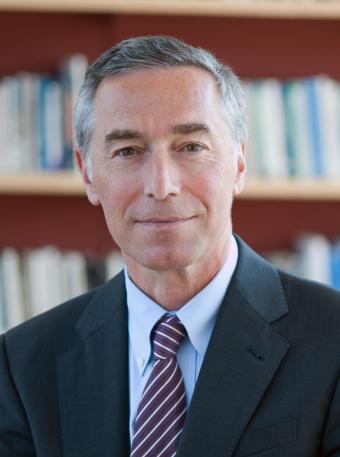PROVIDENCE, R.I. [Brown University] — Richard M. Locke, professor of political science and international affairs and the Howard R. Swearer Director of the Watson Institute for International Studies, has been named the University’s 13th provost. He will begin his duties July 1, 2015, succeeding Provost Vicki Leigh Colvin, who recently announced her return to a career of teaching, research, and University service.
Brown University President Christina Paxson announced Locke’s appointment in a letter to the University community early this afternoon. Paxson wrote that there was broad consensus, after discussions with members of the Corporation and the committee formed last year to guide the previous provost search, that the University would be best served by selecting one of Brown’s strong faculty leaders to serve as the next provost.
“Rick Locke is a highly respected scholar, has positioned Watson as a prominent center for international and public affairs, and emerged as the leading choice among outstanding candidates to lead the University’s academic programs,” Paxson said. “Rick’s appointment will sustain the momentum we have built as we advance the goals outlined in the Building on Distinction strategic plan.”
As provost Locke will serve as the University’s chief academic officer, second in rank to the president and the senior officer in charge when the president is away from campus. Many of the University’s senior positions report directly to the provost, including the deans of the undergraduate College and Graduate School, the dean of the faculty, the University librarian, the chief information officer, dean of admission, director of financial aid, and vice president for research. The provost chairs the University Resources Committee, which develops recommendations for the University’s next budget, and the Academic Priorities Committee, among others.
Last October, Paxson appointed Locke and Ravi Pendse, the University’ chief information officer, as co-chairs of a deficit reduction working group and charged the group with finding $7 million in permanent cost savings for the University. That work, completed this spring, required an immersive understanding of the University’s budget and financial processes, as well as a thorough knowledge of its organizational structure.
Among his accomplishments since arriving at Brown in July 2013, Locke was instrumental in integrating the A. Alfred Taubman Center for Public Policy and American Institutions with the Watson Institute, including development of a new one-year course of study leading to the Master of Public Affairs degree. He has collaborated with academic departments to recruit new faculty and has developed new postdoctoral programs to attract promising young scholars. Under his stewardship, the Watson Institute has raised more than $35 million, enabling significant faculty and programmatic growth.
“I am deeply proud of the progress we have made at Watson during the last two years, and I now look forward to working with the President, faculty, staff, students, and other stakeholders in implementing the ambitious plans that Building on Distinction outlines for the future of this University,” Locke said. “Brown is uniquely positioned to address some of the world's most pressing problems through the innovative teaching and research initiatives outlined in the strategic plan.”
Locke will continue to direct the Watson Institute until a successor has been named.
Richard M. Locke
Locke came to Brown from the Massachusetts Institute of Technology, joining the faculty as professor of political science and director of the Watson Institute. He is an internationally respected scholar and authority on international labor markets, worker rights, comparative political economy, labor relations, and corporate responsibility.
He is the author of five books: Production in the Innovation Economy (The MIT Press, 2014, with Rachel Wellhausen); The Promise and Limits of Private Power: Promoting Labor Standards in a Global Economy (Cambridge University Press, 2013); Working in America (The MIT Press, 2001, with Paul Osterman, Thomas Kochan, and Michael Piore); Employment Relations in a Changing World Economy (The MIT Press, 1995, with Thomas Kochan, Michael Piore); and Remaking the Italian Economy (Cornell University Press, 1995). For his ongoing research on fair and safe working conditions in global supply chains, Locke was named the 2005 Faculty Pioneer in Academic Leadership by The Aspen Institute.
For 25 years prior to his arrival at Brown, Locke was on the faculty at MIT, holding the Alvin J. Siteman Chair in Entrepreneurship and later the Class of 1922 Chair in Political Science and Management. Locke pioneered the Global Entrepreneurship Laboratory at MIT’s Sloan School of Management in 2000, for which he received the MIT Class of 1960 Teaching Innovation Award in 2007 and the Jamieson Prize for Excellence in Teaching in June 2008. He also served as chair of the MIT Political Science Department and deputy dean in the Sloan School of Management.
Locke earned his bachelor’s degree at Wesleyan University, a master’s in education at the University of Chicago, and a Ph.D. in political science, with a specialty in political economy, at MIT. He has held visiting faculty positions in Italy, Germany, the United Kingdom, and Brazil and has received fellowships from the German Marshall Fund, the Social Science Research Council, the Hewlett Foundation, and the Sloan Foundation. He currently chairs the Apple Academic Advisory Board and is a member of the ILO-IFC Better Work Program Advisory Committee.

